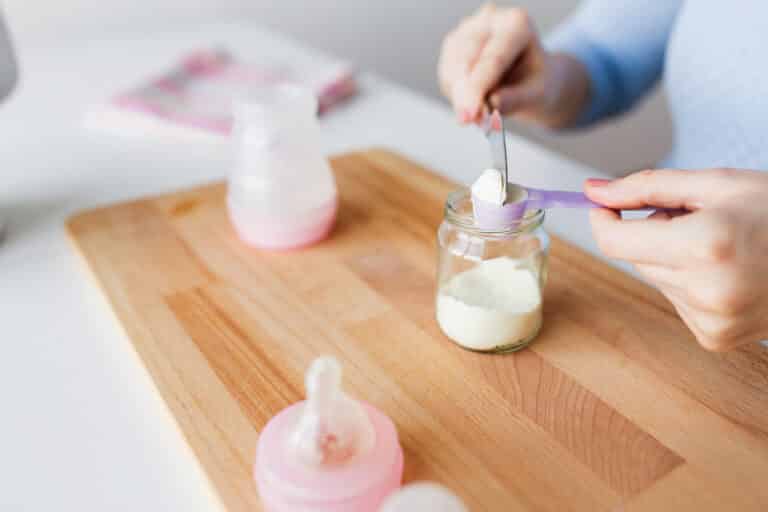Baby skin is delicate and prone to irritation, making it important to take extra care when trying to improve its appearance. Babies naturally have soft and smooth skin, but sometimes factors such as genetics, health conditions, and environment can affect their skin color.
Baby’s skin is sensitive and requires gentle care to enhance its natural glow. According to the American Academy of Dermatology, once your baby’s umbilical cord stump falls off, it is time to start caring for their skin.
But how can you improve your baby’s skin tone naturally? To help you out, we’ve compiled a list of tips and tricks that can help you achieve healthy and radiant skin for your little one. So, scroll down to learn more!
Key Takeaways:
- Keep your baby’s skin hydrated by applying a gentle, fragrance-free moisturizer regularly.
- Avoid harsh chemicals and opt for natural or organic skincare products.
- Make sure to clean and dry all of your baby’s folds and creases to prevent irritation and rashes.
Understanding Baby Skin Color
Before we dive into natural ways to improve your baby’s skin color, it is essential to understand why their skin may have a different hue than yours. The color of a baby’s skin is primarily determined by genetics, which play an incredibly significant role in this fascinating process.
However, genes inherited from both parents decide the amount and type of pigments that will be present in your baby’s skin. These pigments, known as melanin, can be of two types – eumelanin (dark brown or black) or pheomelanin (red or yellow). Thus, your baby’s complexion can range from very fair to dark, depending on the combination of these pigments.
Moreover, newborns often have light, almost pinkish skin, regardless of genetic background. This is because the skin’s melanocytes, which produce melanin, are not fully developed at birth. As your baby grows, exposure to natural light starts stimulating melanin production, gradually leading to changes in skin color.

Tips to Improve Baby Skin Color
Maintaining your baby’s skin health is crucial, not only for aesthetic purposes but also for their overall well-being. Babies have delicate skin that needs extra attention and care. To make your baby’s skin look more radiant and healthy, here are some effective tips to follow:
1. Eat a Balanced Diet
A balanced diet is not just essential for the overall health of the mother and baby but also plays a significant role in promoting your baby’s skin-fair health. The importance of a balanced diet cannot be overstated during pregnancy and breastfeeding.
During these stages, the nutrients you consume directly affect the development and health of your baby’s body, including skin tone. Eating right can contribute significantly towards maintaining healthy skin for your baby. Here are some foods that you should incorporate into your diet:
- Fruits and Vegetables: Rich in antioxidants, fruits and vegetables protect the skin from damage. Foods such as oranges, strawberries, and spinach are packed with Vitamin C, which is essential for collagen production, giving the skin its elasticity and strength.
- Omega-3 Fatty Acids: Foods like salmon, flaxseeds, and walnuts are high in Omega-3 fatty acids, which help in building the skin’s cell membranes, making it smooth and healthy.
- Protein: Essential for tissue repair and growth, protein-rich foods like eggs, chicken, and lentils help in the formation of new skin cells.
- Vitamin E: Foods like almonds and avocados are rich in Vitamin E, which protects the skin from oxidative damage and supports its health.
- Iron and Zinc: Foods rich in iron and zinc, such as meat and seeds, play a crucial role in skin repair and protection.
2. Massage with Natural Oils
According to the Indian Academy of Pediatrics (IAP), massaging your baby with natural oils can help improve their skin tone. Oil massage not only softens and moisturizes the skin but also helps in reducing stress, promoting relaxation, and improving blood circulation. Here are some natural oils that you can use for your baby’s massage:
- Coconut Oil: A popular choice for its hydrating and soothing properties, coconut oil is gentle on the skin and easily absorbed.
- Almond Oil: Rich in Vitamin E and antioxidants, almond oil helps in improving skin tone and protecting the skin from UV radiation.
- Olive Oil: With anti-inflammatory properties, olive oil can soothe irritated skin and is suitable for babies with eczema or psoriasis.
- Sesame Oil: Known for its warming effect, sesame oil helps promote skin health and can be used to massage your baby during the winter season.

3. Keep the Skin Clean
Keeping your baby’s skin clean is one of the most important steps in maintaining their overall skin health. It helps to keep bacteria, dirt, and other irritants away, preventing skin infections and rashes. Here are some tips for keeping your baby’s skin clean:
- Use Gentle Products: When it comes to cleaning your baby’s delicate skin, it is essential to use gentle and mild products. Opt for soap-free, fragrance-free, and hypoallergenic cleansers to avoid any potential skin irritations.
- Wash Folds and Creases: Cleanse your baby’s skin folds and creases carefully, as these areas are more susceptible to rashes and infections.
- Bathe Your Baby Regularly: Bathing your baby two to three times a week is sufficient in the first year. However, if your baby has sensitive skin or gets dirty often, you may need to bathe them more frequently.
4. Keep your baby Hydrated
Hydration is essential for your baby’s sensitive skin. It helps maintain the skin’s elasticity and prevents dryness. Ensure your newborn babies get enough breast milk or formula, as they are their primary source of hydration. As your baby grows older and starts consuming solid foods, make sure they drink enough water every day. To keep your baby’s skin hydrated, you can also:
- Use a Humidifier: Dry air can cause dry and itchy skin. Using a humidifier in your baby’s room can add moisture to the air and help keep their skin hydrated.
- Apply Moisturizer Regularly: Choose a gentle, fragrance-free moisturizer and apply it to your baby’s skin regularly. It will help lock in moisture and keep their skin soft and supple.
- Avoid Harsh Soaps and Bath Products: Harsh baby soap and bath products can strip the skin of its natural oils, causing dryness. Avoid using these products or opt for gentle and mild ones.
5. Protect from Sun Exposure
Babies have very delicate skin that UV rays can easily damage. Therefore, it’s crucial to protect their skin from excessive sun exposure. Here are some ways you can protect your baby’s skin from the sun:
- Shade: Keep your baby in the shade as much as possible, especially during peak hours between 10 am to 4 pm when the sun’s rays are strongest.
- Clothing: Dress your baby in lightweight and breathable clothing that covers most of their skin. Also, invest in a wide-brimmed hat to protect their face, ears, and neck.
- Sunscreen: If your baby is six months or older, you can use sunscreen with an SPF of at least 20. Always make sure about baby skin care products and consult with your pediatrician before applying sunscreen.

6. Avoid Over-bathing
While cleanliness is important, over-bathing can strip the skin of its natural oils, leading to dryness and irritation. Bathing your baby two to three times a week is typically sufficient. To do so;
- Use lukewarm water and mild baby soap when bathing your baby.
- Always rinse off the soap thoroughly to avoid residue buildup.
- In between baths, clean your baby’s face, hands, and bottom using baby wipes or a soft damp cloth.
- After bathing, pat your baby’s skin dry with a soft towel, and after 10 minutes, apply a gentle moisturizer to keep their skin hydrated.
Note: Before giving a bath to your baby, don’t forget to use baby oil as it prevents dryness of the skin. Also, to avoid skin irritation, do not scrub your baby’s skin too hard while bathing them.
7. Use Natural skin cleansers
To make your baby’s skin fair and healthy, it is essential to avoid harsh chemicals found in many commercial skin products. These chemicals can cause skin irritation and allergies, making the baby’s skin more sensitive. Instead, opt for natural or organic cleansers that are free of parabens, sulfates, and fragrances. Some examples include:
- Milk: Milk or raw milk is a gentle and effective cleanser that moisturizes the skin without clogging pores.
- Honey: Honey has antibacterial and anti-inflammatory properties, making it an excellent natural cleanser for your baby’s skin.
- Aloe Vera: Aloe vera has cooling and soothing properties that can help cleanse the skin while also reducing inflammation or redness.
- Shea butter: Rich in vitamins and fatty acids, shea butter is a natural cleanser that can nourish the skin while removing dirt and impurities.
8. Avoid Chemical Products
Chemicals found in skincare products can be harsh and irritating for your baby’s delicate skin. It is best to stick to natural and gentle products, as they are less likely to cause any harm. Here are some chemicals to avoid in your baby’s skincare products:
- Artificial Fragrances
- Dyes and Colorants
- Parabens
- Phthalates
- Sulfates
- Mineral Oil
- Petrolatum
- Synthetic preservatives
These chemicals can cause irritation, rashes, and other skin problems. Instead, choose natural or organic products specially formulated for babies.
9. Keep an Eye on Allergies
It is essential to keep an eye on any potential allergies that your baby may have. Allergic reactions can cause skin irritations, rashes, and other skin problems. If you notice any signs of allergic reactions, discontinue use immediately and consult a pediatrician. Some common allergic reactions in babies include:
- Eczema: A common skin condition in babies, characterized by red, itchy patches on the skin.
- Contact Dermatitis: An allergic reaction caused by direct contact with an irritant or allergen.
- Hives: Red, raised bumps on the skin that may be caused by allergies to certain foods or products.
- Diaper rash: Caused by prolonged exposure to wet or soiled diapers, diaper rash can lead to skin irritation and infection.
Conclusion
To sum it up, to keep your baby’s skin healthy and glowing is important to avoid harsh chemicals, over-bathing, and excessive sun exposure. Making simple changes in your baby’s skincare routine helps you to maintain their natural beauty and keep their skin soft, smooth, and healthy. Furthermore, understanding the science behind a baby’s skin color can help you appreciate and embrace their unique complexion. So, follow these natural ways to improve your baby’s skin, and don’t forget to shower them with love and affection to nurture their overall well-being.
FAQs
Can a baby born dark become fair?
Yes, a baby's skin color can change over time. Many babies are born with a darker complexion that lightens in the first few weeks after birth. However, the final skin tone is determined by genetics and isn't fully apparent at birth.
Does breast milk affect baby complexion?
No, breast milk does not affect a baby's complexion. Skin color is determined by genetics and the production of melanin. While breast milk offers numerous health benefits, it doesn't influence the skin color of your baby.
Why my baby face is fair and body is dark?
This is likely due to melanin distribution. Newborns' skin can vary in color and often changes over time. It's perfectly normal and usually evens out by their first birthday.
Which oil is best for baby skin whitening?
It's important to note that no oil can alter a baby's natural skin color, which is determined by genetics. However, coconut, olive, and almond oils are all excellent for maintaining healthy, moisturized skin. They nourish the skin without causing irritation or dryness.
In what month will a baby’s original skin Colour come?
A baby's original skin color typically becomes apparent around 5 to 6 months after birth, as melanin production stabilizes and external factors like sunlight come into play.
References:
1) American Academy of Dermatology Guidelines to care baby’s skin











